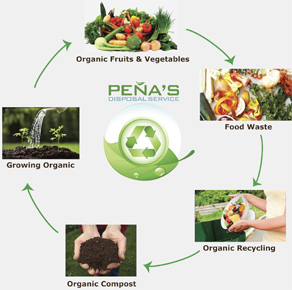SB 1383
In September 2016, SB 1383 was approved by the Governor. Senate Bill 1383 (SB 1383 entitled Short-lived climate pollutants: methane emissions: dairy and livestock: organic waste: landfills) is intended to reduce emissions of short-lived climate pollutants; the goal is to reduce methane by 40%, hydrofluorocarbon gases by 40%, and anthropogenic black carbon by 50% below 2013 levels by 2030. This bill has a greater reach than just waste disposal, but for our part – it is to reduce the organic (food) waste in landfills.
For more information about SB 1383:
- California Legislative Bill Text
- CalRecycle California’s Short-Lived Climate Pollutant Reduction Strategy
The Basics
According to data provided by CalRecycle, organic waste comprises two-thirds of California’s waste stream and food waste is said to be the largest waste stream. When food waste breaks down it creates methane gas, which is more potent than carbon dioxide. Through organic recycling, they believe we can significantly reduce emissions.
Download our SB 1383 brochure – English / Spanish.
SB 1383 expands organic recycling to all businesses and residents effective January 1, 2022:
Businesses that generate two (2) cubic yards or more of waste and Multi-family dwellings with five (5) or more units:
- Will be required to source separate their food waste.
- Businesses that do not generate over 20 gallons of food waste weekly MUST recycle organic fiber material such as paper, cardboard, etc., to be compliant with SB 1383.
- Will be required to subscribe to our Mandatory Organic Recycling Program.
Residents – Single Family and Multi-family dwellings with five (5) or less units:
- Will be required to source separate their food waste.
- Will be required to place food waste in the green container with the yard waste.
- Food waste should be thrown away freely in the green yard waste container – NO plastic bags.
Additionally, all jurisdictions will be responsible for the implementation of a Food Recovery Program designed to redistribute edible food to people in need rather than going to the landfill for disposal. Check your local jurisdiction for more information about their Food Recovery program.



